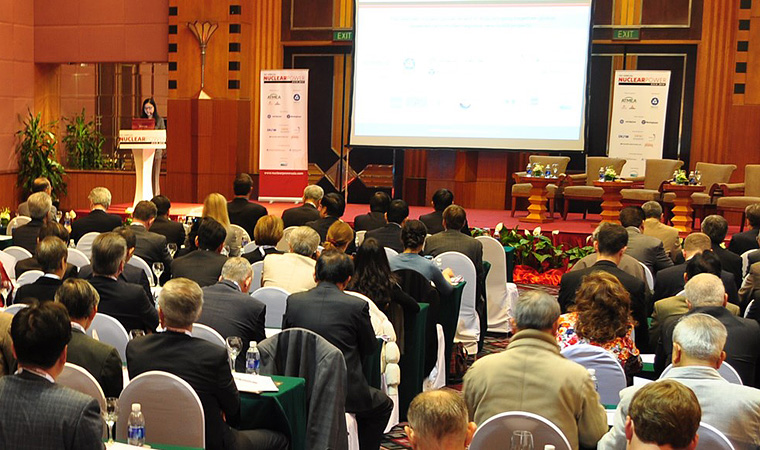
To increase public acceptance of nuclear
back to contentsThe conversation at this session focused on best practices in enhancing public acceptance towards nuclear power in order to tap on to its benefits including economic boost, scientific development, and social impact.
Ivan Dybov, Vice President of ROSATOM International Network a subsidiary of ROSATOM Corporation began the discussion with a showcase, outlining that advantages of nuclear energy go far beyond the electricity supply: “Nuclear technology is a unique tool that is able to deal with various complex challenges facing humanity, including such important fields as medicine, water treatment, ecology and agriculture”, he emphasized.
He said, “Despite the obvious advantages of nuclear technology, it is constantly being affected by the lack of knowledge, which reduce its public acceptance. Public acceptance is vitally important if the country wants to maintain its nuclear energy programs, and ensure its energy security and economic growth”.
ROSATOM’s continuous outreach and commitment to deliver proven and objective information about nuclear energy has resulted with a significant increase in public acceptance in Russia over the past three years with more than 70% of respondents supporting the development of nuclear energy.
The tool that works
One of the tools used by ROSATOM for providing public acceptance are Nuclear Energy Information Centers. Professor Ha Manh Thu, Director of Nuclear Energy Information Center located in Hanoi, shared his experience in working with local audiences of Vietnam. “Nuclear Energy Information Center in Hanoi is a multifunctional communication ground where students, nuclear industry experts and journalists may learn about nuclear technologies. We provide information in an understandable and interactive way within various educational programs. All that makes information center a notable cultural and educational hub of the region,” Professor told.
The workshop also featured a discussion on Public Information and Public Acceptance (PIPA) on Nuclear Technology in Malaysia which highlighted activities and approach by Malaysia Nuclear Agency in educating the nation on nuclear technology development. According to a research conducted by MNA in 2009, more than 70% of respondents support the use of nuclear energy as a source of electricity in Malaysia.
Expertise and knowledge transfer
During the conference ROSATOM demonstrated support for nuclear development in Malaysia and the rest of the ASEAN countries. ROSATOM offered support for the ongoing nuclear energy development initiatives by government agencies such as Malaysian Nuclear Power Corporation (MNPC) and Malaysia Nuclear Association (MNA).
During the plenary session, Nikolay Drozdov, Director of International Business of ROSATOM shared that public acceptance has been one of the key challenges in the development of nuclear power not just in Asia but globally due to alleged safety concerns and the high cost required in developing and managing nuclear power plants. However, this can be attributed to lack of knowledge on the technicalities of nuclear related technologies and how it helps to improve quality of life.
“ROSATOM’s industrial participation plans are not just limited to Vietnam – there is a lot of potential to work with other countries in the region. Our cooperation with Malaysia, Thailand, Myanmar and Indonesia was very well received by the government and local nuclear agencies. We had organized a number of NPP visits since 2012 and we will continue to share our expertise and knowledge on nuclear energy development as well as the benefits it offers”, Mr. Drozdov said.
“We (ROSATOM) are keen to support Malaysia and ASEAN members in their nuclear development plans by offering an integrated solution that includes industrial and financial management, skills transfer, regulatory and infrastructure management and public acceptance education”, he added.
Another important session which that day took place at NPA had the title “Drawing experiences to explore suitable new nuclear ownership models for emerging countries”. Vladimir Chuchkin, Project Director at ROSATOM Overseas, basing on ROSATOM’s expertise reviewed the options for nuclear ownership models, which may be considered for Asian countries. “ROSATOM has vast experience in arranging flexible project financing options: from traditional EPC contract to more complex public-private partnership structures. For example, we are implementing Akkuyu NPP construction project in Turkey, which will be the world’s first build-own-operate (BOO) project in nuclear industry”, he explained.
ROSATOM has a regional headquarters in Singapore established in 2012. The company is looking to play a significant role in Malaysia’s nuclear energy development via partnerships with government agencies and key academic institutions as well as supporting the development of skills and nuclear technology through vocational training.
As the national nuclear corporation for the Russian Federation, ROSATOM brings together over 350 companies and R&D institutions that operate within the Russian nuclear power sector. Having developed advanced enrichment technologies, ROSATOM remains as the only company in the world that offers complete solutions from uranium supplies to NPP construction and operation as well as nuclear waste management.
Nuclear Power Asia serves as a platform for regulators, nuclear energy agencies and operators within the region to gather and discuss on the latest developments in the industry as well as to network with key players in the nuclear sector both from Asia Pacific and further afield.




